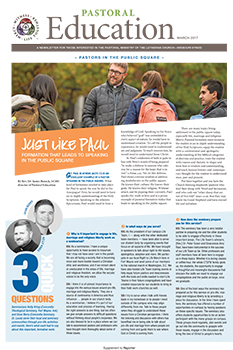St. Paul in Athens (Acts 17) is an excellent example of a pastor speaking in the public square.
What kind of formation needed to take place for Paul to speak the way he did in the Areopagus? First, he would need to have an in-depth understanding of the Holy Scriptures.
Speaking to the atheistic Epicureans, Paul would need to have a knowledge of God. Speaking to the Stoics who believed “god” was embedded in every aspect of nature, he would have to understand creation. To call the people to repentance, he would need to understand sin and judgment. To teach resurrection, he would need to understand Jesus Christ.
St. Paul’s confession of faith is quite in line with Peter’s words of being prepared “to make a defense to anyone who asks you for a reason for the hope that is in you” (1 Peter 3:15).
Yet, in this defense, Paul shows extreme wisdom in addressing nonbelievers in the public square.
He knows their culture. He knows their gods. He knows their religion.
Without attack and by piquing their curiosity, Paul speaks the truth in love and is a prime example of pastoral formation today that leads to speaking in the public square.
There are many topics being addressed in the public square today, especially life, marriage and religious liberty.
Pastoral formation must immerse the student in an in-depth understanding of the Holy Scriptures, equip the student with a confessional and apologetic understanding of the biblical categories of doctrine and practice, train the student with reason and rhetoric to shape and form him in wisdom and understanding, and teach human history and contemporary thought for the student to understand man, past and present.
Put these together and you have the Church forming shepherds (pastors) who feed their sheep with Word and Sacrament, and who seek out “other sheep that are not of this fold” (John 10:16) that they may know the Good Shepherd and have eternal life and salvation.
The Rev. Dr. James Baneck is director of Pastoral Education for The Lutheran Church—Missouri Synod.
[button link=”https://www.lcms.org/Document.fdoc?src=lcm&id=4540″ color=”lcms” window=”yes”]Download Pastoral Education Newsletter[/button]
Visit lcms.org/pastoraleducation to learn more about the programs and ministry of LCMS Pastoral Education.






Replace the word “pastor” and “student” in the excellent article above with the word “Christian” and you have a Scripturally-sound, God-pleasing, Spirit-filled discipleship model that will yield a great harvest according to His good will. To wit:
“Christian formation must immerse the Christian in an in-depth understanding of the Holy Scriptures, equip the Christian with a confessional and apologetic understanding of the biblical categories of doctrine and practice, train the Christian with reason and rhetoric to shape and form him in wisdom and understanding, and teach human history and contemporary thought for the Christian to understand man, past and present.”
This is a call to LCMS churches (laity and clergy together) to energetically, unfailingly equip the priesthood of all believers to “always be prepared” in a culture that has little to no frame of reference to Jesus anymore! Give someone a reason to “ask you about the hope that is in you”, whether you are a pastor or not!
“Christian formation must immerse the Christian in an in-depth understanding of the Holy Scriptures, equip the Christian with a confessional and apologetic understanding of the biblical categories of doctrine and practice, train the Christian with reason and rhetoric to shape and form him in wisdom and understanding, and teach human history and contemporary thought for the Christian to understand man, past and present.”
What are we to do after we’ve learned all we can from books, blogs, podcasts? We’re begging our Pastors to equip us (the laity) in these ways… It seems many are not able to do so.